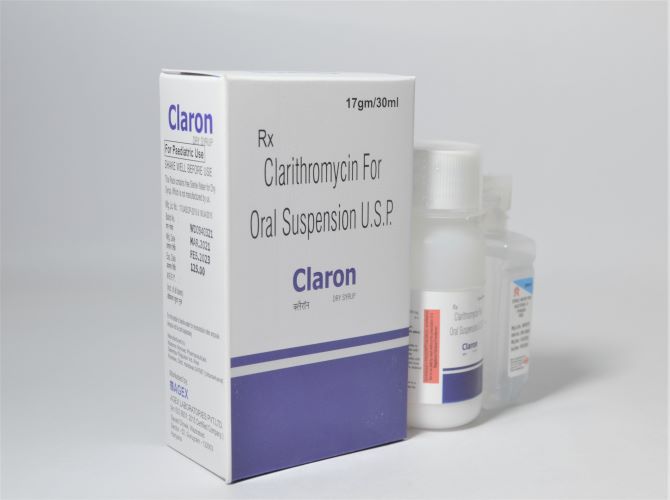
MRP : 125
Indications & Usage
Claron Dry Syrup are indicated in children less than 12 years of age for treatment of the following infections caused by susceptible organisms:
• Lower respiratory tract infections: acute and chronic bronchitis and pneumonia.
• Upper respiratory tract infections: sinusitis and pharyngitis.
• Skin and soft tissue infections of mild to moderate severity.
• Claron in the presence of acid suppression effected by omeprazole or lansoprazole is also indicated for the eradication of H. pylori in patients with duodenal ulcers.
Contraindications
Claron (Clarithromycin) is contraindicated in patients with known hypersensitivity to clarithromycin, to any other macrolide antibiotic drug, or to any of the other ingredients in the tablets.
Concomitant administration of Claron (clarithromycin) and ergotamine or dihydroergotamine is contraindicated, as this may result in ergot toxicity.
Concomitant administration of Claron(clarithromycin) and any of the following drugs is contraindicated: astemizole, cisapride, pimozide and terfenadine as this may result in QT prolongation and cardiac arrhythmias, including ventricular tachycardia and ventricular fibrillation.
Claron (Clarithromycin) should not be used concomitantly with HMG-CoA reductase inhibitors (statins) that are extensively metabolized by CYP3A4 (lovastatin or simvastatin), due to increased risk of myopathy, including rhabdomyolysis. Treatment with these agents should be discontinued during Claron (clarithromycin) treatment.
As with other strong CYP3A4 inhibitors, Claron(Clarithromycin) should not be used in patients taking colchicine. Clarithromycin should not be given to patients with hypokalaemia (risk of prolongation of QT-time).
Claron (clarithromycin) should not be used in patients who suffer from severe hepatic failure in combination with renal impairment.
Warnings & Precautions
Claron (clarithromycin) is principally excreted by the liver. Therefore, caution should be exercised in administering this antibiotic to patients with impaired hepatic function. Caution should also be exercised when administering clarithromycin to patients with moderate to severe renal impairment.
Cases of fatal hepatic failure have been reported. Patients should be advised to stop treatment and contact their doctor if signs and symptoms of hepatic disease develop: such as anorexia, jaundice, dark urine, pruritus, or tender abdomen.
Exacerbation of symptoms of myasthenia gravis has been reported in patients receiving clarithromycin therapy.
There have been post-marketing reports of colchicine toxicity with concomitant use of clarithromycin and colchicine, especially in the elderly, some of which occurred in patients with renal insufficiency. Caution is advised regarding concomitant administration of clarithromycin and triazolobenzodiazepines, such as triazolam, and midazolam.
Caution is advised regarding concomitant administration of clarithromycin with other ototoxic drugs, especially with aminoglycosides. Monitoring of vestibular and auditory function should be carried out during and after treatment.
Dosage & Administration
Children younger than 12 years: Clinical trials have been conducted using clarithromycin paediatric suspension in children 6 months to 12 years of age. Therefore, children under 12 years of age should use clarithromycin paediatric suspension (granules for oral suspension).
Presentation
Claron Dry Syrup: 30 ml bottle with distilled water